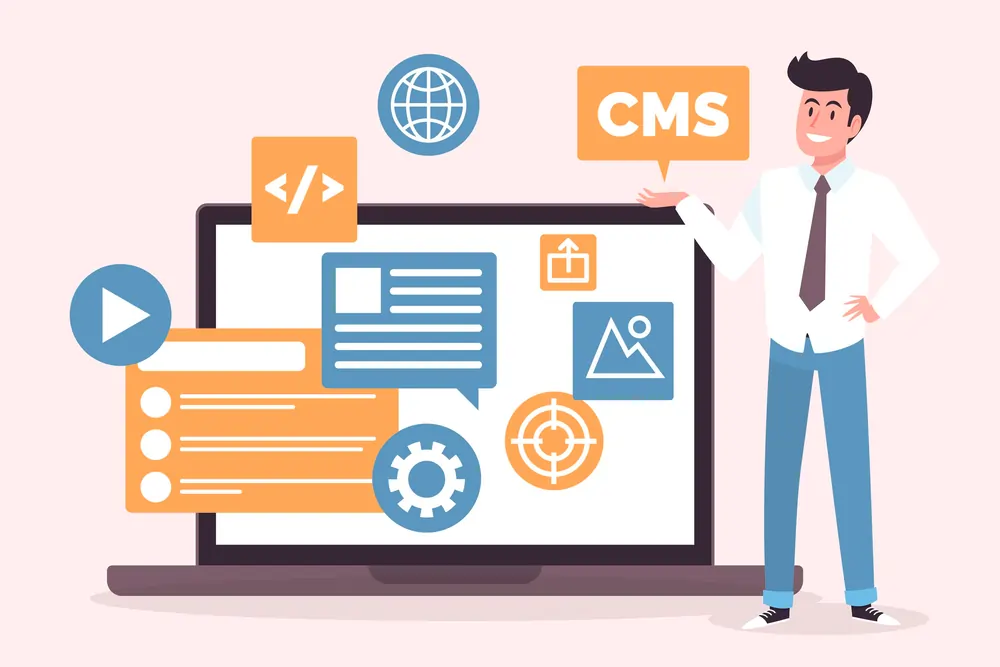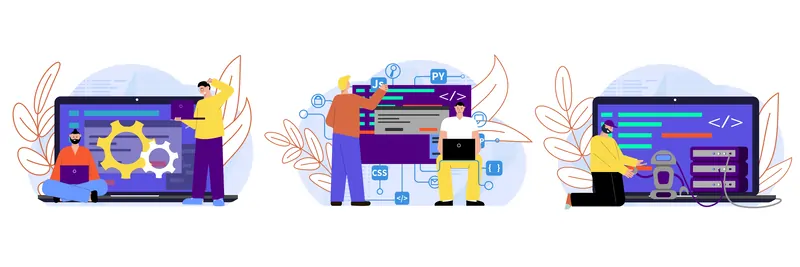Laravel for Enterprises That Need Secure, Scalable, and Fast Applications

The Rise of Enterprise-Grade Web Applications
In the contemporary business landscape, the demand for enterprise-grade web applications has witnessed significant growth. Organizations are increasingly recognizing the necessity of robust solutions to address their multifaceted operational requirements. As companies expand and their processes become more intricate, the need for tailor-made applications that facilitate efficiency, scalability, and collaboration has taken precedence. This trend illustrates a shift toward utilizing advanced software solutions that not only streamline operations but also empower businesses to respond swiftly to market changes.
In today’s fast-moving digital world, large organizations are no longer relying on outdated systems or off-the-shelf software. Instead, they’re embracing custom enterprise web applications built to solve complex, real-world problems like managing workflows, scaling operations, and integrating third-party services.
Why this shift is happening:
Increased complexity in business operations demands software tailored to unique workflows.
Remote and hybrid work models require real-time, cloud-ready platforms.
Security, scalability, and automation are now non-negotiable priorities for enterprises.
Real-world scenario:
Imagine a nationwide logistics company still tracking deliveries using spreadsheets. That system might work for 100 orders a day—but not for 10,000. By switching to a Laravel-powered tracking dashboard, they can monitor real-time data, automate notifications, and scale effortlessly.
The Laravel advantage:
Laravel provides a strong foundation for these enterprise-grade systems:
Modular, well-documented codebase for easy maintenance and upgrades.
Built-in features like authentication, API handling, and job queues.
Seamless integrations with databases, payment gateways, CRM systems, and cloud services.
Powered by Laravel Development Experts:
Partnering with a Laravel development company means tapping into:
Industry experience across SaaS, healthcare, edtech, fintech, and logistics.
Software development consulting services to help you avoid bottlenecks and scale smarter.
Applications development strategies aligned with modern DevOps practices.
Why Laravel Is the Smart Choice for Enterprise Development
Laravel has become the go-to framework for enterprises looking to build scalable, secure, and high-performing web applications. But what exactly makes it so powerful? Let’s break down the strengths that set Laravel apart in the world of enterprise application development.
Modular Architecture for Flexible, Maintainable Code
Laravel’s structure is designed for growth. It uses a modular architecture, meaning your application is built from reusable components. This makes it easier to:
Maintain and update code without breaking the app.
Assign different modules to different teams.
Scale parts of the system independently as your needs grow.
Example: A large eCommerce platform using Laravel can separate its checkout, product catalog, and inventory systems into modules—making upgrades or testing safer and faster.
Clean and Elegant Syntax That Boosts Productivity
Laravel is loved for its expressive and readable code. Developers can get more done in less time, and it’s easier for new team members to jump in and contribute. For enterprise teams working on long-term, collaborative projects, this is a huge advantage.
Instead of spending hours debugging unclear code, teams using Laravel can move fast without sacrificing clarity or stability.
A Thriving Community That Drives Innovation
Laravel isn’t just a tool—it’s backed by a vibrant global community. Thousands of developers contribute to:
Open-source packages and plugins.
Detailed documentation and real-world tutorials.
Quick support through forums and Laravel Discord.
Whether you’re working with an internal tech team or a Laravel development company, this ecosystem speeds up problem-solving and innovation.
Ideal for Software Development Consulting Services
Many enterprise app development companies choose Laravel because it aligns perfectly with modern software design and development practices. From API integrations to complex business logic, Laravel handles it all—without overcomplicating your project.
Laravel’s powerful blend of modular design, developer-friendly syntax, and strong community support makes it a top-tier choice for enterprise application development. If you’re aiming to deliver secure, scalable, and future-proof solutions, Laravel is built to handle the challenge.
Built-in Tools for Fast and Secure Development

Laravel stands out in the realm of enterprise application development due to its ensemble of built-in tools that streamline the development process while ensuring security. One of the most pivotal features is the user authentication system, which allows developers to quickly set up a comprehensive authentication framework. This feature not only simplifies the implementation of registration and login processes but also adheres to security best practices, reducing the risk of unauthorized access. A robust authentication system is an essential component for any enterprise app development company, as it guarantees the protection of sensitive user data.
Routing in Laravel is another key feature that enhances both the speed and security of applications. The framework employs a straightforward approach to define routes, which makes it easier for developers to build RESTful APIs. The clarity in routing also contributes to better application structure, increasing maintainability over time. An organized routing system is fundamental for software design and development projects, ensuring that various components communicate seamlessly while remaining secure from common vulnerabilities.
Caching mechanisms in Laravel further bolster its capability as a laravel development company choice, allowing applications to boost performance significantly. Caching can lessen the database workload and improve response times, which is particularly advantageous for applications with high user traffic. By facilitating data retrieval from cache rather than repeatedly querying the database, Laravel can help maintain efficient application performance.
Lastly, Laravel’s built-in testing capabilities allow developers to conduct rigorous tests on applications, ensuring the code is reliable and performing correctly. This feature underscores the importance of testing in software development consulting services and confirms that applications can handle expected workloads without error. With these powerful built-in tools, Laravel continues to support developers in creating fast, secure, and scalable applications.
Building Scalable Enterprise Systems with Laravel
Scalability is not just a technical buzzword—it’s a necessity for growing enterprises. Whether you’re serving hundreds or millions of users, your application must handle increasing demands without breaking performance. That’s where Laravel stands out as a game-changer for enterprise app development.
Service Container: Smarter Dependency Management
At the heart of Laravel lies its powerful service container, a tool that makes managing dependencies simple and efficient. It allows your application to be flexible and maintainable as it grows.
Real-world example: Imagine you’re expanding an internal HR system to include payroll, employee onboarding, and time tracking. With Laravel’s service container, you can plug in new features without refactoring your core logic—ensuring smooth scaling as your business evolves.
Queue Management: Keeping the System Responsive
Laravel’s built-in queue system lets you handle background tasks like email notifications, PDF exports, or system backups without slowing down the user experience. This is essential for apps with heavy traffic or real-time interactions.
Use case: An enterprise CRM system built with Laravel can queue up thousands of daily email campaigns, so users don’t face delays when they’re browsing contacts or closing deals.
Database Optimization That Grows With You
Laravel’s Eloquent ORM and query builder make it easier to interact with large and complex databases. As your data grows, Laravel supports:
Indexing for faster lookups.
Lazy loading to reduce memory consumption.
Caching for lightning-fast data retrieval.
For example, an enterprise inventory platform can easily scale from hundreds to millions of records without affecting dashboard load times—thanks to Laravel’s efficient database tools.
Horizontal Scaling and Cloud-Ready Architecture
Laravel works well with modern infrastructure like AWS, Azure, and DigitalOcean, making it easy to deploy applications across multiple servers. This ensures that enterprise systems can grow horizontally to meet spikes in demand.
Laravel doesn’t just support scalability—it enables it by design. With smart architecture patterns, background processing, database efficiency, and cloud-readiness, Laravel empowers enterprise development teams to build future-proof software systems.
Laravel for SaaS Product Development

Laravel is a robust PHP framework widely recognized for its capability to streamline software design and development, making it a favorable choice for developing Software as a Service (SaaS) products. One of the significant advantages of using Laravel in SaaS development is its elegant syntax combined with a set of powerful tools that simplify the development process. Developers can create applications rapidly, allowing for faster deployment and iterations, which are crucial in the dynamic SaaS environment.
One of the critical features Laravel offers is built-in support for multi-tenancy. This capability allows developers to create applications that can serve multiple clients on a single instance efficiently. Implementing multi-tenancy reduces operational costs, as it eliminates the need for separate instances for each tenant, thus maximizing resource utilization. Laravel’s robust routing and middleware features also enable seamless management of user sessions, access controls, and application logic, which are essential for multi-tenant applications.
Key Advantages of Laravel for SaaS Development
Multi-Tenant Architecture: Run multiple clients on a single codebase while keeping their data separate and secure.
Built-in Auth and Role Management: Fast implementation of login systems, team roles, and permission control.
Easy API Integration: Connect with payment gateways (like Stripe), CRMs, or third-party SaaS tools via RESTful APIs.
Cloud-Friendly Deployment: Integrates well with AWS, DigitalOcean, and other cloud services to support elastic scaling.
Rich Ecosystem: Use packages like Laravel Cashier for billing, Sanctum for API auth, and Horizon for queue monitoring.
Efficient Team Collaboration: Clean structure and modular design make it easy for teams to scale features collaboratively.
Managing Complex Workflows and API Integrations
In the landscape of modern enterprise applications, effective management of complex workflows and seamless API integrations are paramount for operational efficiency. Laravel, as a leading PHP framework, offers robust tools and conventions that cater to these needs, making it an ideal choice for an enterprise app development company. The framework’s architecture supports modular coding, which aids developers in structuring their projects into smaller, manageable components. This modular approach not only enhances code readability but also simplifies the maintenance and scalability of applications developed by a Laravel development company.
One of the standout features of Laravel is its built-in support for API management. Laravel’s routing capabilities allow developers to easily create RESTful APIs that can interact with various external services. This is essential for enterprises that frequently interact with third-party applications or require integration with disparate systems. For instance, a typical workflow might involve connecting an enterprise resource planning (ERP) system with a customer relationship management (CRM) tool. With Laravel, developers can ensure that data flows seamlessly between these systems, which helps avoid duplication, enhances data integrity, and allows for real-time data sharing.
Furthermore, Laravel facilitates API integrations through features such as Passport, which provides a full OAuth2 server implementation for securing APIs. This ensures that applications not only connect efficiently but also maintain high standards of security. The framework also supports various testing tools, enabling software development consulting services to rigorously test APIs and workflows before deployment. By prioritizing both functionality and security, Laravel equips development teams to deliver enterprise applications that are not only effective but also reliable.
Overall, Laravel’s capabilities in managing complex workflows and API integrations position it as a leading framework for applications development, ensuring that enterprise applications can evolve alongside organizational needs.
Enhancing Developer Productivity and Reducing Time-to-Market
In today’s fast-paced tech environment, achieving a reduced time-to-market is essential for maintaining a competitive advantage. Laravel, as a leading PHP framework, provides a set of tools and features designed to enhance developer productivity significantly while ensuring that high-quality software is delivered promptly. One of the key features of Laravel is its support for Continuous Integration and Continuous Deployment (CI/CD) pipelines. By automating the software development lifecycle, Laravel allows organizations to minimize manual intervention, streamline processes, and consequently speed up the release of applications. These CI/CD practices are fundamental for any enterprise app development company seeking to optimize their workflow and maintain a rapid cadence in delivering software solutions.
Another way Laravel enhances developer productivity is through its elegant syntax and expressive ORM (Object-Relational Mapping) capabilities, which simplify database management. This feature reduces the complexity associated with database interactions, allowing developers to focus on writing code that adds value to the business rather than getting bogged down in backend intricacies. By leveraging such modern software design and development practices, teams can effectively reduce coding errors and enhance overall code quality, resulting in a more efficient development cycle.
Key Benefits of Laravel in Enhancing Developer Productivity
CI/CD Pipeline Support: Automates testing and deployment, enabling faster product releases with minimal manual effort.
Expressive ORM (Eloquent): Simplifies complex database interactions, allowing developers to focus more on business logic.
Efficient Task Scheduling: Built-in task scheduling system to automate repetitive tasks, improving workflow efficiency.
Modular Design: The ability to use reusable packages reduces development time and encourages collaboration between team members.
Extensive Package Ecosystem: Access to a wide range of pre-built packages for features like payment integration, authentication, and API management, saving valuable development time.
Active Community Support: Laravel’s vibrant community offers resources, solutions, and best practices, allowing developers to troubleshoot and move forward quickly.
In conclusion, Laravel not only enhances developer productivity but also significantly impacts the speed at which software products can be brought to market. This ability to quickly deliver robust applications positions organizations to respond effectively to market demands and customer expectations.
Best Practices for Security in Laravel Applications

Security is paramount in developing robust enterprise applications, especially when using the Laravel framework. As a leading laravel development company, it’s imperative to adopt best practices that safeguard applications from common vulnerabilities. One of the foremost steps is adhering to secure coding standards. Laravel facilitates this by supporting measures such as input validation and escaping output, which help prevent cross-site scripting (XSS) and SQL injection attacks. Developers should consistently validate user inputs and ensure that untrusted data is properly sanitized before processing it.
User authentication is another crucial aspect of Laravel’s security features. Leveraging Laravel’s built-in authentication system can significantly strengthen an application. Implementing multi-factor authentication (MFA) adds an additional layer of security, ensuring that unauthorized access is minimized. An enterprise app development company can enhance security further by customizing authentication mechanisms to fit specific business needs while employing secure session management practices.
Data protection remains a priority in software design and development. Laravel comes with built-in encryption features that should be utilized to protect sensitive information. This includes user passwords, payment information, and personal data. It is advisable to use Laravel’s hashing functions to securely store passwords, ensuring that they remain indecipherable even in the event of a data breach.
Regular security audits are also essential. Engaging in software development consulting services can facilitate these audits, allowing developers to identify and address security weaknesses proactively. Utilizing tools like Laravel’s built-in security checks helps ensure that the application adheres to the latest security standards.
In conclusion, by following these best practices, developing secure Laravel applications becomes feasible, ensuring the integrity and reliability of enterprise systems. As industries increasingly rely on applications development, prioritizing security will lead to more resilient software solutions.
Conclusion: Future-proofing Your Enterprise with Laravel
In the ever-evolving landscape of software development, choosing the right framework can significantly impact an organization’s ability to adapt to changing market demands. Laravel, a robust PHP framework, has gained considerable recognition among enterprises seeking reliable and scalable software solutions. By leveraging the strengths of Laravel, businesses can enhance their software development endeavors, particularly in the realm of enterprise application development.
One of the most compelling advantages of using Laravel is its emphasis on simplicity and elegance in software design and development. The framework encourages clean and maintainable code, leading to improved collaboration among development teams. This clarity not only expedites initial development timelines but also simplifies future updates—an essential factor for any enterprise app development company aiming to remain competitive. Furthermore, the extensive ecosystem of Laravel, including a plethora of packages and integrations, allows for rapid applications development that caters to diverse business needs.
Scalable Solutions: Laravel offers powerful features to build scalable applications that can grow with your business, ensuring long-term viability.
Enhanced Security: With built-in security tools, Laravel helps protect sensitive data and mitigates common vulnerabilities.
Maintainable Code: Laravel’s clean and elegant syntax promotes maintainable code, easing future updates and minimizing technical debt.
Extensive Ecosystem: Laravel’s rich ecosystem of packages and integrations supports rapid development, allowing businesses to meet diverse needs.
Future-Ready: With its constant updates and active community, Laravel positions enterprises to remain competitive and adaptable in a dynamic market.
FAQs about Laravel for Enterprise Use
Laravel has emerged as a formidable framework for enterprise application development, becoming a preferred choice for many businesses. However, as with any technology, questions arise regarding its suitability, scalability, and overall efficacy. Below are some frequently asked questions pertaining to the use of Laravel in enterprise environments.
1. Is Laravel suitable for large-scale applications?
Yes, Laravel is exceptionally well-suited for large-scale applications. It provides an elegant syntax and extensive functionality, which facilitates the development of complex systems. The framework’s features, such as Eloquent ORM and a robust routing system, support the advancements in enterprise app development, making it easier to manage large data sets and complex user interactions.
2. How does Laravel handle scalability?
Scalability is one of Laravel’s key strengths. Its modular structure allows developers to implement additional features without disrupting existing functionalities. Furthermore, Laravel’s built-in support for caching, queues, and task scheduling enhances performance under heavy loads, making it an attractive option for organizations looking to expand their service offerings.
3. What are the benefits of using Laravel’s built-in features?
Laravel offers numerous built-in features, such as authentication, routing, and session management, which streamline the software design and development process. This is particularly beneficial for businesses that require rapid development cycles. Moreover, using a dedicated Laravel development company ensures that enterprises receive expert guidance and best practices for optimized application performance.
4. Can Laravel be integrated with other software?
Certainly, Laravel is designed to work seamlessly with various third-party services and APIs. Its extensibility makes it easier to implement software development consulting services, allowing organizations to leverage existing tools and enhance their applications development processes.
In conclusion, through its extensive capabilities and community support, Laravel stands out as a reliable framework for enterprise application development, catering to the diverse needs of businesses seeking scalable software solutions.

